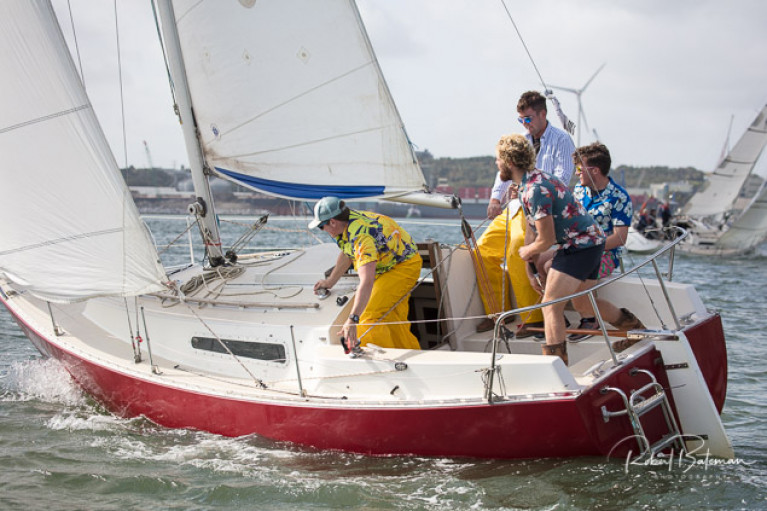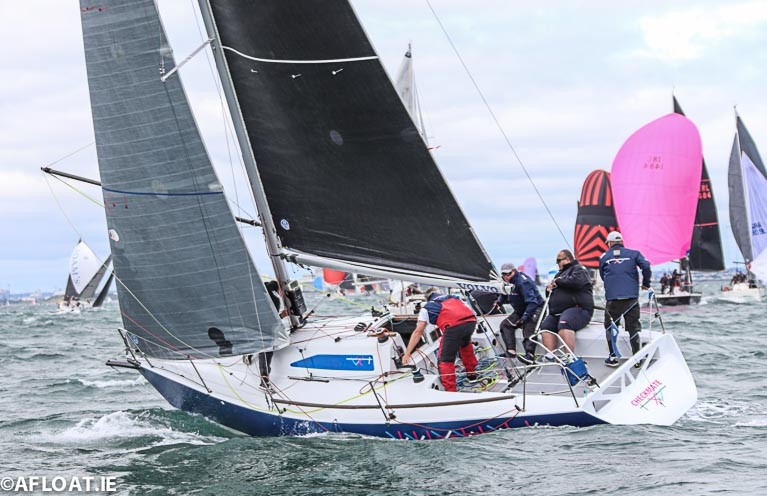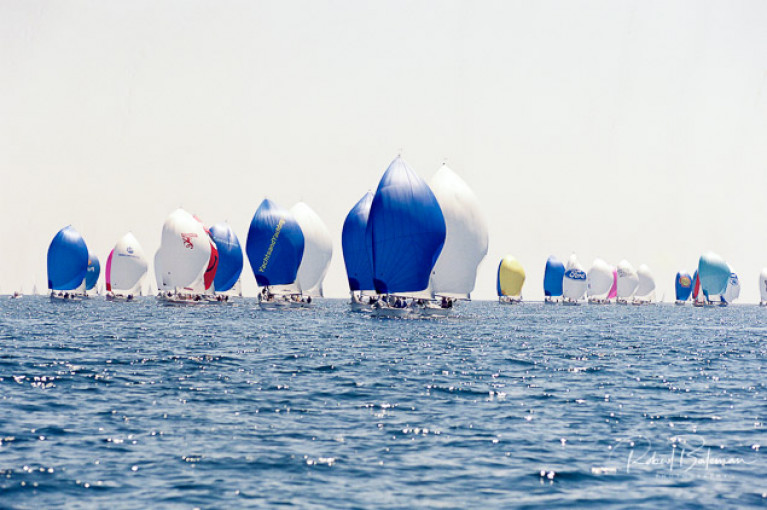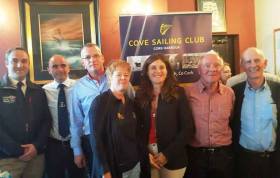Displaying items by tag: cruiser racing
Cruiser Racing Programme on the Cork Coastline Takes Shape
A preliminary list of cruiser racing events on the Cork coastline lists the Kinsale YC Spring Series set for an Easter Monday start, April 1.
At the RCYC in Crosshaven, evening racing is set for a start on Thursday, May 2.
The Kinsale series will continue on Sundays, April 7, 14, and 21 and conclude on Saturday, April 27.
At the RCYC, May 2 will start the Thursday Night Leagues for cruisers throughout the summer – spinnakers and whitesails - with Friday night league racing for Whitesails only, beginning the following evening, May 3. A Sunday offshore series is scheduled to start on Sunday, May 26.
A ‘Keelboat Forum’ for RCYC members is to be held on Saturday, March 9, from 3-4.30 p.m. at the RCYC, and an online survey of sailors’ attitudes to racing is underway.
Initial, tentative contacts are understood to be being made between Cork Harbour clubs about the possibility of resuming combined clubs racing on Friday nights. This had been held for a number of years but ceased when Covid restrictions impacted events.
Cruiser racing has returned with a strong turn-out at the RCYC in Crosshaven for the start of evening racing.
.
Eighteen boats came to the start line for the first Thursday evening cruiser league race.
Despite rain, mist and fog, which had gripped the South Coast in unpleasant weather for the past few days, the pent-up demand for the return of competition was shown in tight racing.
For RCYC Rear Admiral for Keelboat Racing, Daragh Connolly, it was the end of a long wait for the racing fleet to get back on the water competitively and the sailors took the opportunity.
Racing results on the RCYC website here
George Radley Junior & Getting Young Sailors into Cruiser Racing – Buying an Old Boat
The Commodore of the South Coast Offshore Racing Association believes there are yachts "out there waiting for budding enthusiasts to give them a second or third chance" and which could be used to encourage the next generation of young sailors into cruiser racing.
"There are many boats lying idle, young people could get together to buy a boat, work on it as a project and get out sailing – another one to add to the fleet," says
Johanna Murphy.
It's an idea suggesting how boats not being used, seen in boatyards and on moorings. could be brought into the sport through the interest and encouragement of young sailors. As I've said, I believe in giving young sailors the opportunity to move into cruisers. On my own Sigma 33, Scribbler, this is the policy and has been quite successful. It is encouraging to see young sailors putting into effect, with natural ability, the training they've received in clubs and sailing schools.
 Tom MacSweeney's Sigma 33, Scribbler Photo: Bob Bateman
Tom MacSweeney's Sigma 33, Scribbler Photo: Bob Bateman
Twenty-year-old George Radley Junior from Cobh is my Podcast guest this week. Son of Johanna and well-known George Radley, he has brought a Sadler 25, Creamy Beam, into the Cove Sailing Club fleet. While a new boat to the fleet, it's an older boat, in reality, one which he acquired for not a lot of money, but with a lot of work as part of a sales deal and which required refurbishment. He outlines how this was done.
George Jr. has put into practice what his mother suggested as a way of getting more young sailors into cruiser racing. Of his crew of three, two are aged 21 and the other, like him, 20 years old. He tells me that it's better on a cruiser than being "wet and cold" in dinghies, which he has also sailed and that there haven't been any bad days afloat.
It's a Podcast to lift the spirits, hearing the enthusiasm of young sailing.
Listen to the Podcast below
ICRA National Championships Will Not Be Sailed in 2020
ICRA Commodore Richard Colwell on the cancellation of the 2020 Championships planned as part of Wave Regatta 2020
It is with a heavy heart that we announce that Howth YC and Fingal County Council have taken the unenviable decision to cancel Wave Regatta 2020 due to the concerns over COVID 19 precautions. ICRA has been involved in these discussions which have explored all possibilities to keep the event alive in some format and we fully support their decision. It means that, at this stage of the season, the ICRA National Championships will not now proceed in 2020.
In discussions with HYC and the main sponsor Fingal County Council, it is clear that due to the current increase in cases and the fact that we have been held at phase 3 for the foreseeable future, the event could not go ahead safely so we fully endorse this decision made on public health grounds. It recently clear that with the numbers involved we simply can’t justify running the event and maintaining social distancing required under the current restrictions.
This is obviously not the news that any of us on the ICRA committee, as avid cruiser racers wanted to hear, as we would all love to get back to what we love and hosting National cruiser racing events.
Having said that, our first and foremost concern has to be the health and safety of all involved in any event.
ICRA will continue to do all we can to support and encourage club cruiser racing for the rest of the year, as well as continuing to support the development of the Under 25 programme and ratings platform development.
We will now work hard on plans for next year's event - at which stage hopefully we will all have learnt how to deal with the virus better and be in a position to back fully to cruiser racing and again run national events.
Some Insurers Would Put a Stop to Inter-Club Yacht Racing
“You will notice that the premium has increased on last year. This is not something that is particular to just your policy. All clients have seen their premiums increase this year.”
The warning letter from my insurance brokers was blunt and clear.
The first paragraph of their letter was followed by: “The reason for the increase is that the last few years, 2017 in particular, have seen some very significant disruption in the marine insurance market with successive years of severe losses coupled with premium income failing to meet the rising cost of claims. This resulted in some underwriters withdrawing from the marine sector altogether. With a hardening and contracting market industry, bulletins point to predictable increases in premiums, while the highest risk (perceived or otherwise) cases may find it difficult to arrange cover or will be faced with restricted terms and higher excesses. There have been a couple of claims–free cases where Insurers have declined to offer renewal terms at all.”
Racing boat owners are facing hikes for insurance, some of which could be substantial, added to which there are restrictions appearing in policies which could affect activities such as inter-club racing.
For example, one company – Amlin – would only insure for racing in leagues or regattas organised by one’s own club. In Cork Harbour that would prevent me racing Scribbler, my Sigma 33, in some of the combined league races, because the harbour clubs alternate running them. It would also block participation in the Cobh-Blackrock Race to other than Cove S.C. members, the organising club. Another company, Beazley, wanted the boat ashore after the end of September, which would exclude the Autumn League at the RCYC, the biggest of the season. I was told by my broker that in Ireland there were those who would not insure a Sigma. I was told: “For whatever reason, the underwriters have decided they do not want to insure them, they do not provide any further explanation.”
I checked with a few clubs about insurance changes. Some owners had experienced similar attempts to insert limiting conditions previously, such as no inter-club racing. had resisted them individually and that the changes had not been proceeded with.
Well, those conditions are back again it seems and, so far, there’s no indication that companies which want to get more money from boat owners are prepared to change their minds.
Limiting racing to one’s own club would affect boats taking part in inter-club regattas and other events and what about Championships?
I was told that “rather than bundling all racing into one category there is a move by insurance companies to differentiate between those that race in club races only as those boats are deemed to be “less competitive.”
To change the conditions and get coverage for inter-club racing and cover to the end of October involves substantial premium increases for my boat. To include inter-club racing Amlin wanted €193 more than a premium for one’s own club racing only.
Beazley’s hike for October cover was €58 onto the original quote. Both companies inserted petty massive increases in the excess on a policy.
For club committees, one club Secretary told me, it will make the Notice of Race even more important. Sailing Instructions require that competitors need to have insurance but, does everyone read the small print of their insurance agreement to make sure that they are covered for racing outside of their own clubs and is this something clubs will have to be aware of.
It seems the warning for “buyer beware” is very appropriate for racing yacht insurance this year.
This week’s Podcast below
Eye on the Storm at ICRA Conference & AGM at Royal Irish Yacht Club
You’d like the absolute one hundred per cent top-level insider information on what gives with the approaching Storm Jorge? Well, unless things conspire to such total destructiveness that she has to be at her command post 24/7 as Jorge sweeps in close past Ireland tomorrow, Evelyn Cusack - the face of Met Eireann - is the lead speaker at the Annual Conference of the Irish Cruiser Racing Association in the Royal Irish Yacht Club tomorrow.
It gets underway at the civilised but prompt time of 1100hrs as the attendance – already upwards of 80 have registered, and it’s expected to easily top the hundred mark on the day – is coming from all over lreland. They'll hear Commodore Richard Colwell and his team review a successful year, and go through the programme for 2020. However, the country’s favourite Weather Woman is scheduled to be the opening speaker at 11 am in a comprehensive programme covering an extensive range of additional informative topics, including Sailmaker/Trainers and the progress with the Under 25 Teams, which is one of the jewels in the crown of ICRA achievement.
There’ll be further details revealed of ICRA-related events, and a Forum will be included to allow members to gives their views and float ideas on how the Association can be progressed, while the formula for choosing the Boat of the Year 2020 will be outlined and analysed.
In all, it will be an intense highly-focused gathering, and for those needing sustenance for a spot of in-conference grazing, the good news is that coffee, tea and scones will be available in the club from 10.30 am, while more substantial lunch arrangements can be made with the RIYC Catering Office.
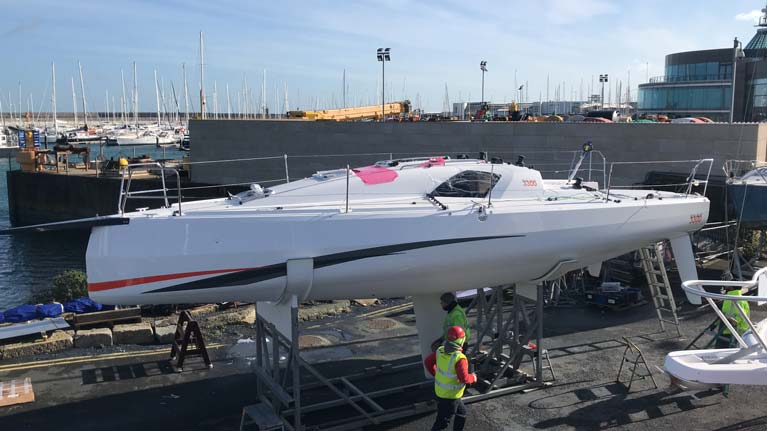 The MGM Sunfast 3300 has arrived in Dun Laoghaire
The MGM Sunfast 3300 has arrived in Dun Laoghaire
As for a spot of associated interest, while the intriguing Sun Fast 3300 newly delivered to Ireland is still being commissioned at the MGM yard just along the waterfront, you might manage to contrive a quick look-see. And if you’re interested in an alternative boat which may be the pioneering Olympic Offshore Racer selected for the 2024 Games, Andrew Algeo’s new J/99 will be in the immediate neighbourhood.
Racing Cruisers Need Younger Sailors
Hello and welcome to my weekly Podcast …. Tom MacSweeney here ….Getting more younger sailors into cruiser classes is vital to ensure the future of racing these yachts. From meeting with and talking to club officers around the country, it seems that most of them are of this view. I certainly believe it. From the time I started racing cruisers, when I left dinghies into which my advancing years dictated that my physical ability in boarding and crewing them was becoming limited, I have seen many of those who were kind enough to advise and encourage my early days in the comfort of cruisers, leave the sport as their years advanced.
In more recent times there has been an increasing problem of maintaining the interest of younger sailors in sailing, once they advance through teenage years in dinghies into their 20s and onwards, with modern life offering many counter attractions.
The path from dinghies into cruisers seems to be less regularly trodden than before, so it was encouraging to see a big attendance of younger sailors at the annual keelboats prizegiving in the RCYC. This year was the biggest attendance of young club sailors at the prizegiving. On my own boat, I have been fortunate enough to have a young crew at times, drawn from the Topper dinghy fleet and it has been a revelation to see how they could race a 33ft. Sigma – and win. Also encouraging was the welcome given to them by older sailors against whom they were competing. A number of family cruiser-racers in the Crosshaven club now have younger sailors crewing and whitesail has been useful in this development.
The RCYC, through the initiative of Rear Admiral Keelboats, Kieran O’Connell, introduced the Under–25 Academy which is showing signs of nurturing future cruiser-racers. An Under 25 ‘Sailor of the Year’ Trophy was introduced to the keelboat awards this year.
Tom Dolan at RCYC
There was also a good turn-out of younger sailors when Tom Dolan gave the first in a series of planned talks about his sailing season and his future plans at the RCYC in Crosshaven on Tuesday night. It was good to hear him exchange views with and answer questions from the younger sailors, as well as the older and more experienced who attended the talk. Tom Dolan presented a riveting account of his sailing exploits, discussing with an amusing touch, his successes and his errors. He is deservedly in the running for Irish Sailor of the Year, a good example of a younger sailor representing Ireland internationally.
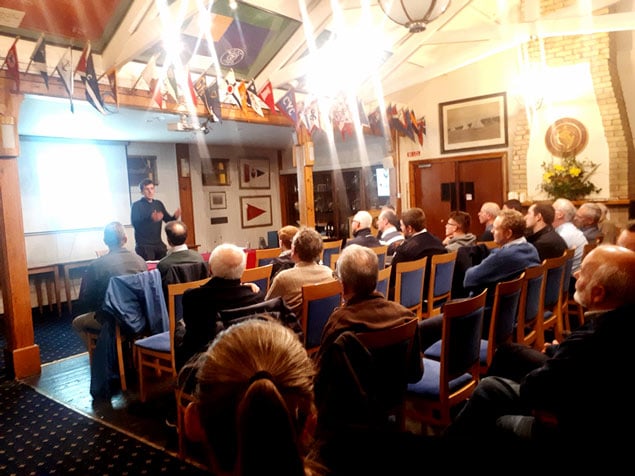 Tom Dolan speaking to RCYC members at Crosshaven
Tom Dolan speaking to RCYC members at Crosshaven
Listen to the podcast below
Nobby Reilly Details Decision To Resign From ICRA
#ICRA - Norbert ‘Nobby’ Reilly has spoken to Afloat.ie to clarify his comments over his resignation from the Irish Cruiser Racing Association (ICRA) last week.
As previously reported on Afloat.ie, the Howth Yacht Club sailor and former ICRA commodore left the organisation on the eve of a crucial symposium at the weekend to decide its future, citing disagreements with its direction over the previous year.
Among these were claims that little of its funding boost since signing a memorandum of understanding with Irish Sailing went to new training programmes or recruitment of new members.
Reilly also referred to the decision to make Galway the host venue of the 2018 ICRA Nationals was not passed by the executive, and that the first he learned of it “was on Facebook”.
Commenting to Afloat.ie on Friday, IRCA commodore Simon McGibney said that Reilly had been given a fair hearing regarding his complains, adding that decisions “are always done by majority”.
But Reilly has hit back at assertions that there is “democracy” in the organisation, claiming that no minutes of meeting have been produced where Galway was agreed as this year’s venue.
Following the announcement, Reilly says there was “a storm of protests” from Dublin-based cruiser racers.
A survey was sent out to all members to gauge whether or not they sailed in the 2017 ICRA Nationals at the Royal Cork, the results of which have yet to be officially published.
“All summer ICRA received emails and calls protesting about Galway,” adds Reilly. “I requested that same be made available to [the] ICRA exec but reply received [was] “These were personal to the commodore.’”
Reilly says there was a push within the organisation for an EGM to review the danger of becoming irrelevant to the Dublin fleet, which constitutes the majority of IRCA’s membership.
Instead, a full executive meet was arranged, but Reilly claims that its members had not all been made aware of the complains from the Dublin membership, and that the resulting meeting only saw 50% attendance.
Reilly says his pitch to the executive that IRCA talk with Galway with a view to keeping Dublin as a host venue for the 2018 calendar was voted down — and he was further shot down over his request that Dublin keep a slot by running an East Coast IRC.
“The exec in ICRA is just irrelevant,” adds Reilly on his decision to resign. “Recently two new members [were] added with no discussion or prior notice.”
Norbert Reilly Resigns From ICRA On Eve Of Crucial Symposium
#ICRA - Norbert 'Nobby' Reilly has resigned from the Irish Cruiser Racing Association (ICRA) over disagreements with its direction in the last 12 months.
In his resignation letter submitted yesterday (Thursday 18 January), the Howth Yacht Club stalwart and former ICRA commodore suggested that it is “probably a good time to wind up” the association, on the eve of a symposium to determine its future direction.
Reilly accused ICRA of “getting in the way of its own plan” since a memorandum of understanding signed in 2016 with the ISA, now Irish Sailing, led to a boost in its finances for cultivating and promoting cruiser racing in Ireland.
Of its €50,000 budget for 2017 — four times ICRA’s revenue in 2015 — allocations of €11,000 were made for training and €8,500 for recruitment via CrewPoint.
But Reilly claims only €2,000 of the former was spent in clubs (Howth YC and the Royal Cork) which already have training programmes in place, with little spend or results for the latter.
Fixture clashes, disputes over venue selection, a drop in crew numbers and a poor return from its communications/web and social media budget are some of the other issues cited by Reilly in influencing his decision.
Specifically, Reilly says that the selection of Galway as host venue of this year's ICRA Nationals was not passed by the executive, and that the first he knew of the decision “was on Facebook”.
Speaking to Afloat.ie on Reilly’s resignation, ICRA commodore Simon McGibney paid tribute to his contributions to cruiser racing, but added that the departing executive’s comments should not affect plans for the weekend symposium, which starts tomorrow morning in Limerick.
“Strategically what we’re trying to do is to take a good look and review where we [as ICRA] want to see ourselves in the next five years, and that has always been the case going forward.”
McGibney added that he believes Reilly was given a fair hearing from the ICRA board, but decisions “are always done by majority”.
Regarding the ICRA Nationals in Galway this August, McGibney dismisses suggestions that the event would not be a ‘true nationals’ without the presence of Dublin boats because “there is a rotation of where the Nationals will be hosted” as bound by the ICRA constitution.
“Galway is an ideal location to bring it to the West Coast,” he added, urging people to “look at the bigger picture” of the event as “a promotion for cruiser racing on a national level.”
Cove Sailing Club Announces Link-up With Monkstown Bay to Boost Cruiser Racing in Cork Harbour
Cove Sailing Club launched its programme for the season with confirmation of joint cruiser racing to be sailed with neighbouring Monkstown Bay SC in an attempt by both clubs to boost cruiser participation in Cork Harbour writes Tom MacSweeney.
Cove SC Commodore Joanna Radley and Monkstown Bay’s Cruiser Class Captain Henry Jefferies said that the development had been discussed for some time and that both clubs would continue to have their own dedicated events, while also combining racing which would be held alternately at Cobh and Monkstown. Both clubs had experienced declining fleet numbers over recent seasons and this was a determined attempt to reverse the trend.
Royal Cork Yacht Club’s Rear Admiral for Keelboats, Kieran O’Connell, who was present welcomed the development and said that the RCYC would look forward to the possibility of joining in next season when all three clubs could strengthen cruiser racing.
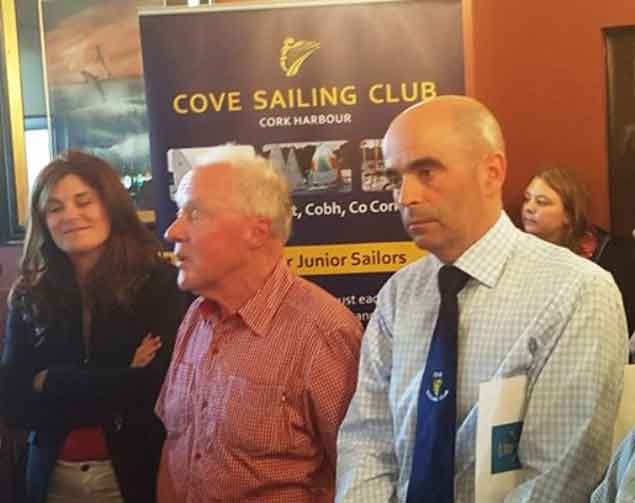 Cove Sailing Club Commodore Joanna Radley, Monkstown Bay Cruiser Class Capt Henry Jefferies and Cove Sailing Secretary Pat Coakley at the Announcement of the Joint Racing programme
Cove Sailing Club Commodore Joanna Radley, Monkstown Bay Cruiser Class Capt Henry Jefferies and Cove Sailing Secretary Pat Coakley at the Announcement of the Joint Racing programme
“This is a wonderful harbour, with great opportunities for sailing, of which every opportunity should be taken,” is the approach being taken by the clubs. The joint Cove/MBSC events will concentrate on whitesail, which is the focus of Monkstown Bay SC cruisers. Cove includes spinnakers in its racing events.
The agreed approach, as previously reported by Afloat.ie will start with both clubs joining forces for the first time on Sunday May 21, starting together on the Cove SC line and again the following Saturday, May 27 On Saturday, June 3, the June Bank Holiday Weekend both clubs will race in Monkstown. The clubs will gather together again in Cobh on four Fridays in June – 9, 16, 23 and 30. A race to Kinsale, which will also be a ‘feeder’ for the Sovereign’s Cup there, is planned on Saturday, June 17. For boats not taking part in the Cup series, there will be a race back to Cork Harbour the following day.
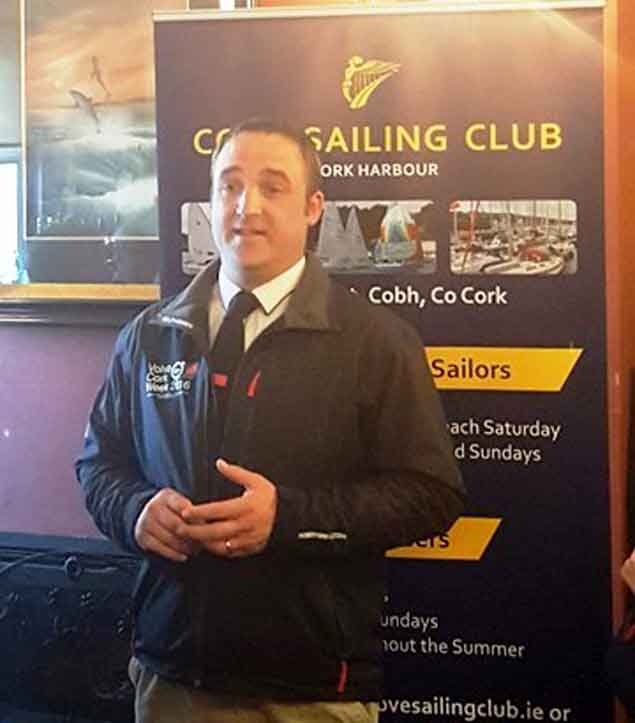 Kieran O'Connell RCYC Rear Admiral Keelboats – looks forward to the possibility of joining in next season when all three Cork Harbour clubs could strengthen cruiser racing
Kieran O'Connell RCYC Rear Admiral Keelboats – looks forward to the possibility of joining in next season when all three Cork Harbour clubs could strengthen cruiser racing
In July Monkstown will hold its ‘At Home Regatta’ on Saturday, July 8, which SCORA, the South Coast Offshore Racing Association, is expected to support and on Saturdays, July 15, 22, 29, Cove will join MBSC in racing at Monkstown. On Sunday, July 23 racing will be in Cove. On Saturday, September 2, the Ballinacurra Race will start from Cove and finish in East Ferry. Saturday, September 9, is the date scheduled for the annual Cobh-to-Blackrock Race and there are joint MBSC and Cove SC events planned on Saturdays September 16, 23 and 30.
“Hopefully, this inter-club initiative will boost cruiser racing in Cork Harbour,” officers of both clubs said.
At the launch in the Quays bar and restaurant on the Cobh waterfront, Cove Sailing Secretary, Pat Coakley, announced an extensive sailing programme for both the club’s dinghy and cruiser fleets. Saturday sailing will include a dedicated training schedule, outlined by Michelle Gray Mooney.
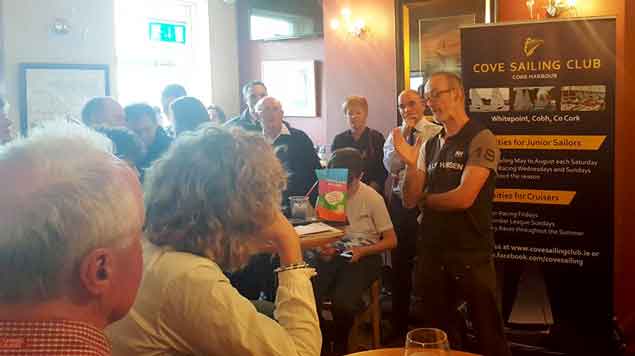 Maurice Kidney outlining the Rankin Dinghy Revival at the Cove Sailing Club Launch
Maurice Kidney outlining the Rankin Dinghy Revival at the Cove Sailing Club Launch
Maurice Kidney detailed the revival of the Rankins, the historic dinghy associated with Cove SC. On Saturday, May 20, the Rankins are planning a gathering in Cobh and Crosshaven for Ida Hadley, the sister of boat builders Eric and Dave Rankin, who built these wonderful Cork harbour dinghies from the late 50s to the 80s.



























